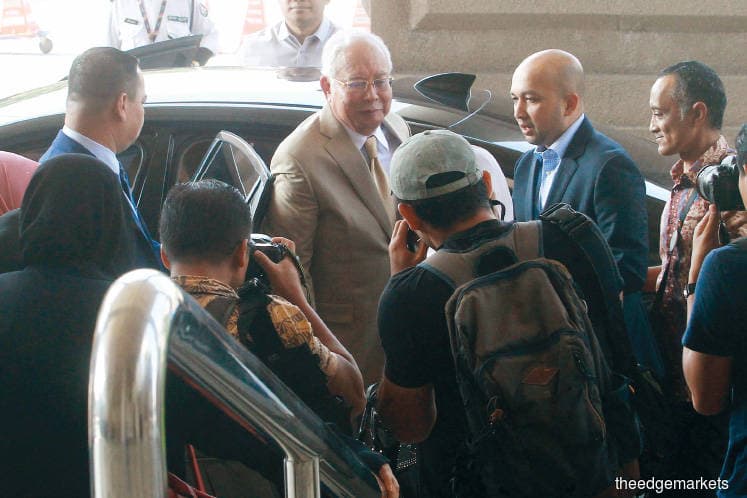
This article first appeared in The Edge Financial Daily on October 18, 2019
KUALA LUMPUR: 1Malaysia Development Bhd’s (1MDB) Article 117 in its memorandum and articles of association (M&A), which requires written approval from the prime minister before the fund can decide on a wide range of matters, was not the first provision in a government-linked company to be structured that way, according to lead defense counsel Tan Sri Muhammad Shafee Abdullah.
“This kind of far-reaching power is not uncommon,” Muhammad Shafee said while cross-examining the prosecution’s ninth witness, 1MDB former chief executive officer (CEO) Datuk Shahrol Azral Ibrahim Halmi yesterday.
Muhammad Shafee cited the example of Petroliam Nasional Bhd’s (Petronas) M&A, which he claimed was also very controversial as it granted the PM even more powers over the company than 1MDB’s did.
According to Article 109 of Petronas’ M&A, the “chairman of the board shall be appointed by the prime minister and shall at all times hold proxy with respect to all shares held by the government and such proxy shall be exercised [under the direction] of the prime minister.”
“This is such an overwhelming power, as the prime minister can virtually overrule the entire board,” he added.
In fact, he further went on to show that even ministers are granted similar “far-reaching powers” over companies under their portfolio.
Muhammad Shafee cited other provisions that include Section 10 of the Bank Simpanan Nasional Act 1974, which allows the finance minister to give general directions to the board regarding policies to be pursued by the bank.
Besides that, Section 12 of the Bank Pertanian Malaysia Bhd Act 2008 enables the minister of agriculture and agro-based industry to give directions to the board in respect of agriculture policies to be pursued by the bank, which the board shall comply with.
Under the Tabung Haji Act 1995, the minister in charge may appoint the chairman and CEO of their choice.
Meanwhile, Iskandar Regional Development Authority and Kampong Bharu Development Corporation Act 2011 also allows the premier to appoint the chairman and CEO in charge of the corporations.
As such, Muhammad Shafee argued that Shahrol had wrongly interpreted Article 117 by giving the former prime minister free reins on how to manage 1MDB, describing Najib as the “emperor of 1MDB”.
Muhammad Shafee explained that under Article 117, although certain events may not take place without the written approval of the prime minister, the decision still lies with the board of directors.
Muhammad Shafee: I’m putting it to you, this provision is almost like veto power, for the PM to veto any necessary decision by the company [instead of coming up with his own decision].
Shahrol: That is fine in black and white but in practice, it doesn’t happen that way.
Muhammad Shafee: I’m putting it to you, it is still a wrong interpretation. You have just made the PM the emperor of 1MDB. Like the good old days in India. There was no check and balance.
Shahrol: At Phases 1, 2 and 3 [of Shahrol’s witness statement], I would say yes.
Muhammad Shafee: So he was [indeed] the emperor of 1MDB.
Shahrol had previously claimed that former prime minister Datuk Seri Najib Razak invoked Article 117 in order to proceed with the issuance of the RM5 billion Islamic Medium Term Notes by Terengganu Investment Authority (TIA), the precursor of 1MDB, in 2009.
In excusing his responsibilities as the CEO for certain decisions taken by 1MDB, Shahrol repeatedly cited Article 117 throughout the cross-examination since last week as the reason why he followed instructions from Low Taek Low, which he believed were relayed from Najib.
On Sept 2, 2009, Minister od Finance Inc, as the ultimate shareholder, moved a resolution to include Article 117 in TIA’s articles of association.